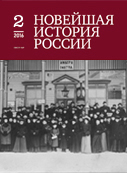«Темное пятно» на репутации Коминтерна: дело об исчезнувших французских делегатах
A “Dark Stain” on the Reputation of the Comintern: the Case of the Missing French Delegates
Author(s): L. V. Slutskaya Subject(s): History
Published by: Издательство Исторического факультета СПбГУ
Keywords: Comintern; II Congress of the Comintern; the anarcho-syndicalists; the communist movement; Soviet Russia; the Emergency Commission; socialism
Summary/Abstract: This article is devoted to the mysterious disappearance of three French Comintern delegates: the socialist Raymond Lefebvre, and the anarcho-syndicalists Bertho Lepetit and Marcel Vergeat as they returned from Soviet Russia to their homeland after the Second Congress in 1920. According to the official version presented by the Soviet authorities, the French delegates died on October 1 of that year during a storm on the Barents Sea. Their disappearance caused a great public resonance in France and dealt a significant blow to the reputation of the Comintern. Among the circles of French anarchists, anarcho-syndicalists and socialists there ensued persistent rumors about the fact that the French delegates had actually lost their lives because of their opposition to Bolshevik policies. Furthermore, other accounts in the country’s right-wing press about a politicized murder of these French delegates only fanned the flames of such rumors. Despite attempts by Soviet and French Communists to shift responsibility for their disappearance onto the "villains of the Entente", the official version of their death has been questioned repeatedly. Based off analysis of archival documents and the testimony of contemporaries well-acquainted with the French delegates, this article also reveals a number of contradictions in the official version of events. First, the man in charge of seeing the French off home was not actually in the Comintern, but instead one Viktor Kingisepp—a known Cheka officer, as well as a member of the Supreme Revolutionary Tribunal of the RSFSR, and one of the organizers of the Estonian Communist Party. Second, there is no mention in any of the official documents uncovered here that the bodies of the French and their belongings were ever found. But in the correspondence of the Comintern staff it follows that the French belongings were said to be sent to Berlin. There are also uncovered here differences in the actual date of the French delegates’ death. Whether this disappearance was a crime designed as an intentional elimination of the dissent from the political arena is still an open questions. There is still no direct evidence of Lefebvre, Lepetit and Vergeat’s murder. And no investigation has ever been carried out. Until that is done, and without any evidence documenting what really happened to them, it can be only assumed that the French delegates paid with their lives for their opposition to the Bolshevik policies. The death of Lefebvre, Lepetit and Vergeat had certain implications for the future fate of the French left-wing movement. It largely predetermined the split of the General Confederation of Labor in 1922 where the Confederation’s anarchists and anarcho-syndicalists moved to oppose joining the Comintern’s Third International.
Journal: Новейшая история России
- Issue Year: 6/2016
- Issue No: 16
- Page Range: 124-137
- Page Count: 14
- Language: Russian

